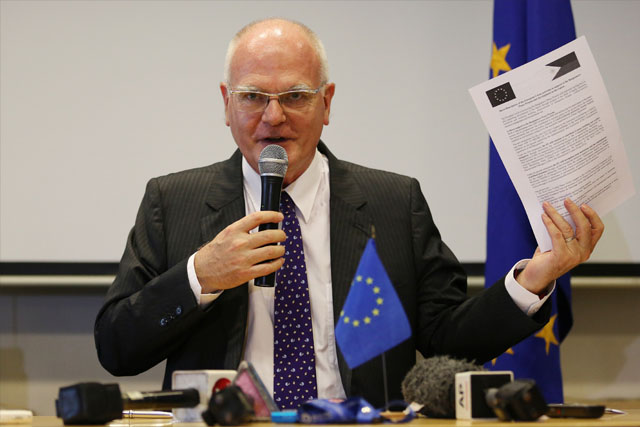EU mulls P6B grant for Marawi, says Philippine policy on refusing aid not yet final

European Union Ambassador to the Philippines Franz Jessen. Philstar.com/File
MANILA, Philippines — The Philippine government’s decision to refuse international aid that comes with conditions is not yet an official policy, the European Union’s ambassador here said Thursday as he announced a fresh grant from the bloc for the rehabilitation of Marawi City.
Asked if talks are ongoing to convince the Philippines to “change” its policy on accepting aid, EU Ambassador to Manila Franz Jessen said he believes the government has yet to decide on the matter with finality.
He also said he had a “very good” and “very intense” meeting last Tuesday with Foreign Affairs Secretary Alan Peter Cayetano and Finance Secretary Carlos Dominguez III.
“I’m not aware that a final decision has been taken. So there’s nothing to change at this point in time,” Jessen told reporters.
“What we do is continue with our development program as it has been agreed previously,” he added.
Jessen then disclosed that the bloc might give as much as 100 million euros (P6 billion) for the rehabilitation of battle-scarred Marawi, adding that job creation is the “major focus” of the grant as well as other peace initiatives in Mindanao.
While the assistance is still being discussed by both officials of the EU and the Philippines, Jessen said he expects the planned aid to proceed if things go well.
“We look at this as not just reconstruction but also to give people hope and permanent jobs in the region, in the area,” Jessen said.
“I expect that the misunderstandings that we’ve had in the past will be ironed out as we move forward,” he added.
Europe’s offer to help rebuild Marawi came after the government announced it would reject conditional assistance from international donors to discourage them from meddling in Manila’s internal affairs, and as part of the administration’s “independent foreign policy.”
The EU has been a strong critic of President Rodrigo Duterte's anti-drug campaign, which has taken the lives of more than 3,900 suspected drug personalities.
Citing police data and Duterte’s remarks “encouraging” cops to take “aggressive approach” on drug suspects, EU this week released a report flagging the worsening “respect for the right to life, due process and the rule of law” in the Philippines during the second half of 2016.
On Wednesday, Cayetano said the new “policy” of turning down foreign aid with strings attached came from Duterte himself, adding that such a move would not make Filipinos who need assistance suffer.
Cayetano also said foreign donors like the EU have the option to channel their assistance through “international organizations” if they really want to help.
Meanwhile, in the same interview on Thursday, Jessen said the hefty grant for Marawi would be a “government-to-government” agreement.
He also took the occasion to point out that in accepting external assistance, the aid-giving body and the recipient country must enter into a contract that would ensure the donation would be spent correctly.
“Anybody would have an agreement where you’re offering €50 million or €55 million—of course you have a document behind that. And in that document, there are so to speak conditions and one of them is it has to be done in a transparent and corruption-free manner,” Jessen explained.
“I have no problem with Secretary Cayetano’s statements. Obviously, the Philippines should have an independent foreign policy—that’s very normal for me. We have no issue with that whatsoever,” he added.
Europe had been funding about 100 community projects across the country, which is drawn from the European Development Fund.
In 2015, EU had more than doubled its grant assistance to the Philippines to 325 million euros (P17 billion) for 2014-2020, channeling “a more than proportional amount” of it to Mindanao as part of the bloc’s contribution to the peace process.
In 2014, the Philippines was granted beneficiary country status under the General System of Preference (GSP+)—a preferential trade deal that allows 6,200 of its products to enter the EU market duty free.
However, the alleged cases of extrajudicial killings in the country as part of Duterte’s drug war has put at risk the country’s GSP+ privileges.
The country’s beneficiary status under the GSP+ necessitates the implementation of the 27 international treaties and conventions on human rights, labor rights, environment and governance.
Results of the latest GSP+ review is expected to come out in January next year.
READ: 'No surprises' for Philippines, EU says, as results of trade perks review loom
Editor's note: €1 = P61.24
- Latest
- Trending




























